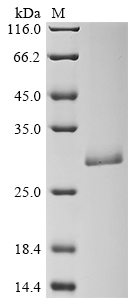Recombinant Staphylococcus aureus Enterotoxin type E (entE)
CAT:
399-CSB-BP320170FKZc7-01
Size:
1 mg
Price:
Ask
- Availability: 24/48H Stock Items & 2 to 6 Weeks non Stock Items.
- Dry Ice Shipment: No




Recombinant Staphylococcus aureus Enterotoxin type E (entE)
- CAS Number: 9000-83-3
- Gene Name: entE
- UniProt: P12993
- Expression Region: 28-257aa
- Organism: Staphylococcus aureus
- Target Sequence: SEEINEKDLRKKSELQRNALSNLRQIYYYNEKAITENKESDDQFLENTLLFKGFFTGHPWYNDLLVDLGSKDATNKYKGKKVDLYGAYYGYQCAGGTPNKTACMYGGVTLHDNNRLTEEKKVPINLWIDGKQTTVPIDKVKTSKKEVTVQELDLQARHYLHGKFGLYNSDSFGGKVQRGLIVFHSSEGSTVSYDLFDAQGQYPDTLLRIYRDNKTINSENLHIDLYLYTT
- Tag: C-terminal 6xHis-tagged
- Source: Baculovirus
- Field of Research: Microbiology
- Assay Type: In Stock Protein
- Relevance: Staphylococcal enterotoxins cause the intoxication staphylococcal food poisoning syndrome. The illness characterized by high fever, hypotension, diarrhea, shock, and in some cases death.
- Purity: Greater than 90% as determined by SDS-PAGE.
- Activity: Not Test
- Length: Full Length of Mature Protein
- Form: Liquid or Lyophilized powder
- Buffer: If the delivery form is liquid, the default storage buffer is Tris/PBS-based buffer, 5%-50% glycerol. If the delivery form is lyophilized powder, the buffer before lyophilization is Tris/PBS-based buffer, 6% Trehalose, pH 8.0.
- Reconstitution: We recommend that this vial be briefly centrifuged prior to opening to bring the contents to the bottom. Please reconstitute protein in deionized sterile water to a concentration of 0.1-1.0 mg/mL.We recommend to add 5-50% of glycerol (final concentration) and aliquot for long-term storage at -20℃/-80℃. Our default final concentration of glycerol is 50%. Customers could use it as reference.
- Molecular Weight: 32.1 kDa
- References & Citations: "Cloning and nucleotide sequence of the type E staphylococcal enterotoxin gene."Couch J.L., Soltis M.T., Betley M.J.J. Bacteriol. 170:2954-2960 (1988)
- Storage Conditions: The shelf life is related to many factors, storage state, buffer ingredients, storage temperature and the stability of the protein itself. Generally, the shelf life of liquid form is 6 months at -20℃/-80℃. The shelf life of lyophilized form is 12 months at -20℃/-80℃.
